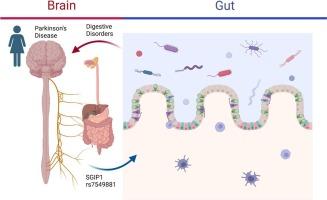SNP rs7549881位于SGIP1附近的1p31.3位点,与女性消化系统疾病和帕金森病显著相关
IF 1.8
Q3 CLINICAL NEUROLOGY
引用次数: 0
摘要
在一个罕见的家族病例中,1p31.3位点的dsgip1 (SH3GL相互作用内吞适配器1)与早发性帕金森病有关。我们在UK Biobank中研究了邻近的内含子SNP rs7549881 (A >; G, MAF 0.43)与帕金森病(PD)和其他性状的关联。方法共纳入385629名受教育年限≥7年的英国生物银行参与者。经年龄、性别、吸烟和便秘校正的Logistic回归评估rs7549881与PD之间的关系。使用PheWeb进行PheWAS以确定其他表型关联。结果在女性中,26.0%的rs7549881 GG纯合子患有PD,而22.2%的女性没有PD (p = 0.004)。在男性中未观察到显著的基因型与pd的关联。Logistic回归显示,年龄(OR 1.14)、男性(OR 1.83)和便秘(OR 4.73)增加PD风险,而吸烟具有保护作用(OR 0.75)。GG基因型与AA相比,PD风险增加(OR 1.21, p = 0.015)。PheWAS与胃肠道表型(包括功能性消化紊乱和非感染性胃肠炎)有显著相关性。结论snp rs7549881与女性PD和两性胃肠道疾病相关。这些发现强化了SGIP1在突触内吞作用中的作用,并提示其在PD患者肠-脑轴功能障碍中的作用。本文章由计算机程序翻译,如有差异,请以英文原文为准。

SNP rs7549881, near SGIP1 at 1p31.3, is significantly associated with digestive disorders and Parkinsonism in women
Background
SGIP1 (SH3GL Interacting Endocytic Adaptor 1) at 1p31.3 has been implicated in early-onset Parkinsonism in a rare familial case. We investigated the nearby intronic SNP rs7549881 (A > G, MAF 0.43) for association with Parkinson’s disease (PD) and other traits in the UK Biobank.
Methods
A total of 385,629 UK Biobank participants with ≥7 years of education were included. Logistic regression adjusted for age, sex, smoking, and constipation evaluated the association between rs7549881 and PD. PheWAS was performed using PheWeb to identify additional phenotypic associations.
Results
Among females, 26.0 % of rs7549881 GG homozygotes had PD, compared to 22.2 % without PD (p = 0.004). No significant genotype-PD association was observed in males. Logistic regression showed that age (OR 1.14), male sex (OR 1.83), and constipation (OR 4.73) increased PD risk, while smoking was protective (OR 0.75). GG genotype conferred increased PD risk versus AA (OR 1.21, p = 0.015). PheWAS identified significant associations with gastrointestinal phenotypes, including functional digestive disorders and noninfectious gastroenteritis.
Conclusion
SNP rs7549881 is associated with PD in females and with gastrointestinal disorders across both sexes. These findings reinforce the role of SGIP1 in synaptic endocytosis and suggest its contribution to gut-brain axis dysfunction in PD.
求助全文
通过发布文献求助,成功后即可免费获取论文全文。
去求助
来源期刊

Clinical Parkinsonism Related Disorders
Medicine-Neurology (clinical)
CiteScore
2.70
自引率
0.00%
发文量
50
审稿时长
98 days
 求助内容:
求助内容: 应助结果提醒方式:
应助结果提醒方式:


